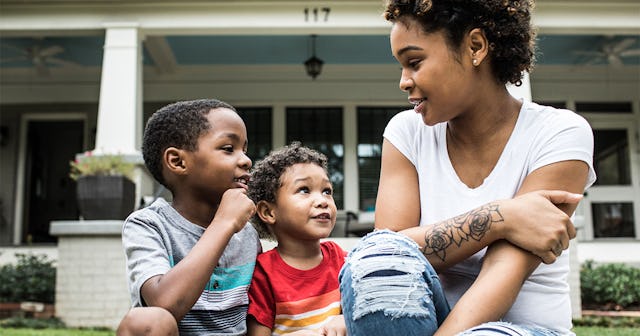It’s Okay To Parent Each Of Your Children Differently

We all know it takes a village to raise children. And if the last two years have clearly illustrated anything for us as parents, it is that our kids’ teachers are integral to their upbringing. In fact, as a fourth-generation teacher, I was raised from the get-go to revere educators. I mean, they’re the ones being trained to handle our kids in the classroom, right? The rest of us are just figuring it out on the fly.
Speaking of, one of the first things I learned as an educator was that kids have different learning styles. There are several theories that consider the various, identified modalities, and educators are introduced to all of them as a way of anticipating our students’ needs. Beyond learning about them, it is also our task as teachers to use these methods to inspire our curriculum. I mean, we know by now not all kiddos can learn through traditional means, right? Susie may take to long division easily, while lil’ Marge might need hands-on, tactile play to truly reinforce the lessons.
And once you become a parent, boy, does it become clear how different people in the same family truly can be. This is easy to see in our own children, but I’ve also seen it in the hundreds of students I’ve had the privilege of educating over the years.
Relatedly, as our socio-educational theories grow and develop, we have learned that all kids have different needs. Of course, there are legitimate diagnoses to acknowledge that may require extra attention and care, “special needs,” if you will. But no matter if we’re discussing developmental, emotional, mental, or physical abilities, everyone’s are different. That means everyone’s specific needs must be a little different, too. Good teachers can acknowledge these differences and adapt their curriculum to cater to their students. Great teachers can acknowledge these differences and adapt their teaching style and curriculum to cater to their students.
It’s exhausting and difficult, but we expect it of our kids’ teachers, right? I mean, if our child is falling behind, we may get them a tutor. But we also want to know what else can be done in the classroom to give them extra support. To top it off, teachers are available by email and phone nowadays. If you’re anything like me, you’ve definitely messaged them with concerns or questions about your individual kids’ needs.
So, then with that logic, why don’t we do the same in parenthood? Why do we not acknowledge more often how different our children can be, and thus, their needs?
Instead, I feel our culture is plagued by an archaic, lingering “What I Say Goes” mentality that has fueled generations of parent-child feuds. The message American youth has been given decade after decade is that we must respect our elders and adhere to their boundaries.
Until it’s our turn to be the elders, that is. Then we get to make the rules.
But what if the right way to teach our kiddos to be the best possible people they can be is to make less rigid rules and more accommodations? To celebrate and nurture their differences by providing them specific, pre-determined support?
In other words, what if it’s okay to be a different mom for each of your kids?
Actually, what if it’s better for you to be a different mom for each of your kids because they all need something different?
This article was originally published on